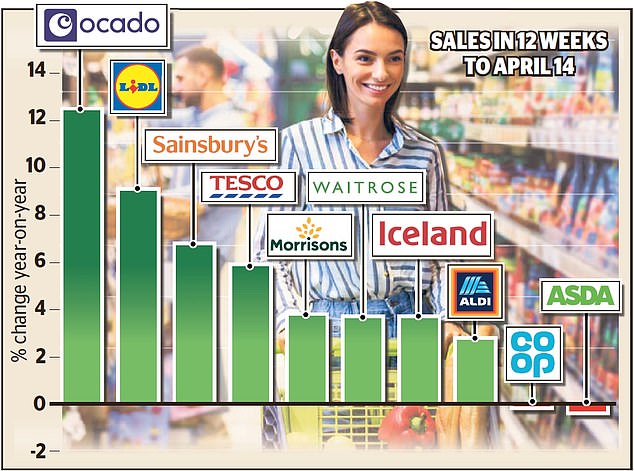Ocado was yesterday named the fastest-growing supermarket in the UK for the second month in a row, while Asda is the only major player to see its sales fall.
In a closely watched update on the state of the grocery market, industry research group Kantar said Ocado sales were 12.5 percent higher in the 12 weeks to April 14 than in the same period. from the previous year.
That overshadowed strong results from Lidl, Sainsbury’s and Tesco, in a sign that middle-class shoppers are returning to Ocado after opting for cheaper rivals as living costs soared.
The company’s shares rose 5.4p but are still down almost 90 per cent since peaking during the Covid-19 pandemic, when shoppers flocked online to buy groceries.
Marks & Spencer is also believed to be growing strongly as its recovery continues, but the High Street retailer is not included in Kantar’s monthly report.
Industry research group Kantar said Ocado sales were 12.5% higher in the 12 weeks to April 14 than in the same period a year earlier.
However, the update made for dismal reading for Asda, with sales for the 12-week period down about 0.4 per cent on the previous year.
That made it the worst performer of all the big supermarkets and underlined how far it has fallen since its takeover by the Issa brothers and their private equity backers three years ago.
In a boost for shoppers, the report showed that grocery prices are only 3.2 percent higher than a year ago.
Food price inflation has fallen for 14 consecutive months, from a high of 17 percent, and is at its lowest level since November 2021.
As cost pressures ease, supermarkets have embarked on a fierce price war to attract shoppers, benefiting Ocado and its joint venture with M&S, along with Tesco and Sainsbury’s.
Kantar said £638 million was spent on Ocado during the 12-week period, giving it a 1.9 per cent market share, up from 1.7 per cent a year ago.
It’s another sign that the partnership between M&S and Ocado, which allows Ocado customers to buy M&S groceries online, is finally bearing fruit.
Welcoming the figures, Ocado Retail boss Hannah Gibson said: “It’s fantastic to see that our focus on unbeatable choice, unrivaled service and reassuringly good value is resonating with shoppers.”
Retail expert Nick Bubb said: “Online grocery appears to be making a comeback, because food price inflation has fallen again and shoppers are therefore under less pressure to go to supermarkets for bargains.”
Ocado’s revival looks better from that perspective, but M&S’s greater influence on the product range should also help attract more customers.’
It was another strong period for Tesco, Britain’s biggest supermarket, which made 12-week sales of £9.3bn.
That lifted its market share to 27.4 per cent from 27 per cent a year ago, in a boost for chief executive Ken Murphy as he faces questions over his £10m pay package.
Sainsbury’s also saw its market share rise from 14.9 per cent to 15.3 per cent as £5.2bn passed through its tills.
Lidl was the only other supermarket to see its market share increase (from 7.6 per cent to 8 per cent a year ago), while Aldi’s fell from 10.1 per cent to 10 per cent.
Morrisons and Waitrose held firm with 8.7 per cent and 4.5 per cent respectively, but Asda’s market share fell from 14 per cent to 13.4 per cent.
By some measures, Asda has already lost its place as the country’s third largest supermarket to Aldi. Sales also fell at the co-op, the report showed.

